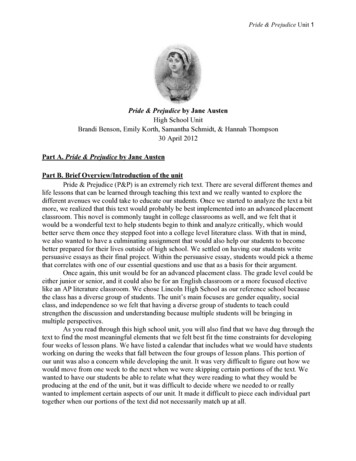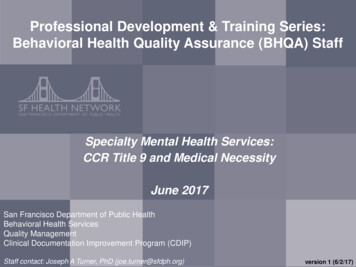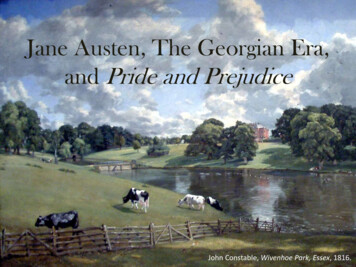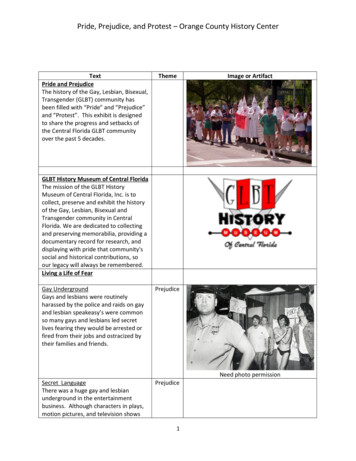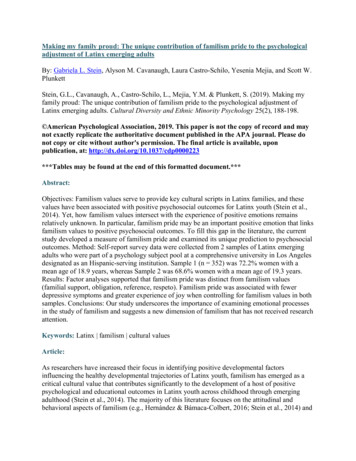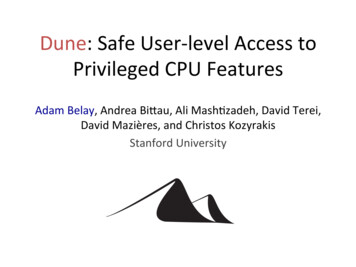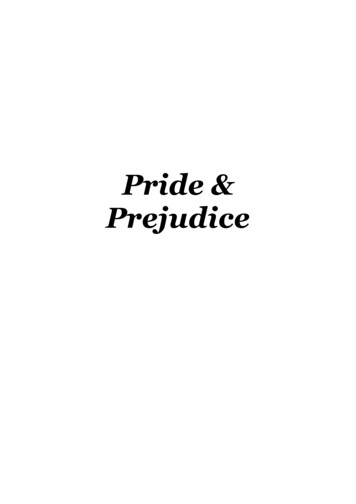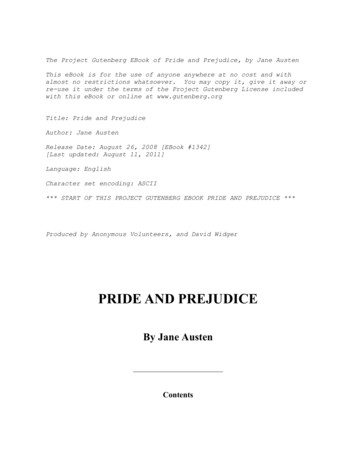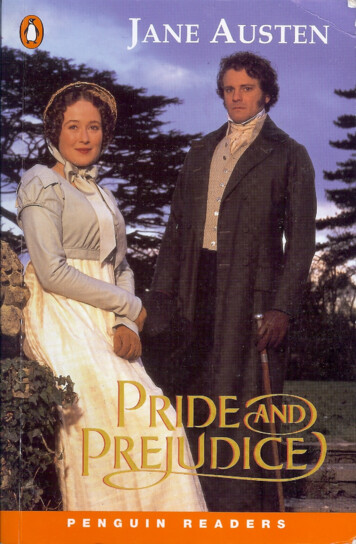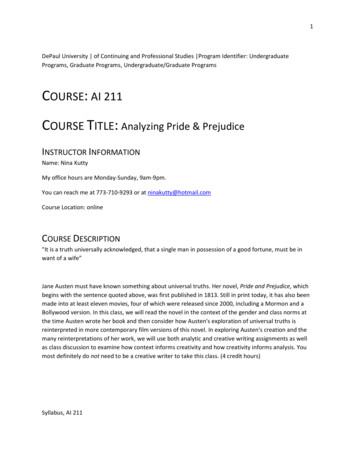
Transcription
1DePaul University of Continuing and Professional Studies Program Identifier: UndergraduatePrograms, Graduate Programs, Undergraduate/Graduate ProgramsCOURSE: AI 211COURSE TITLE: Analyzing Pride & PrejudiceINSTRUCTOR INFORMATIONName: Nina KuttyMy office hours are Monday-Sunday, 9am-9pm.You can reach me at 773-710-9293 or at ninakutty@hotmail.comCourse Location: onlineCOURSE DESCRIPTION"It is a truth universally acknowledged, that a single man in possession of a good fortune, must be inwant of a wife”Jane Austen must have known something about universal truths. Her novel, Pride and Prejudice, whichbegins with the sentence quoted above, was first published in 1813. Still in print today, it has also beenmade into at least eleven movies, four of which were released since 2000, including a Mormon and aBollywood version. In this class, we will read the novel in the context of the gender and class norms atthe time Austen wrote her book and then consider how Austen's exploration of universal truths isreinterpreted in more contemporary film versions of this novel. In exploring Austen's creation and themany reinterpretations of her work, we will use both analytic and creative writing assignments as wellas class discussion to examine how context informs creativity and how creativity informs analysis. Youmost definitely do not need to be a creative writer to take this class. (4 credit hours)Syllabus, AI 211
2LEARNING OUTCOMES AND, IF RELEVANT COMPETENCIES:After completing this course, you will be able to: Explain criteria for choosing texts for analysis Apply this criteria to select film versions of Pride and Prejudice for analysis Describe narrative devices and how they work in producing meaning in texts Use a repertoire of questions to ask about character, plot, setting, theme, point ofview, and figurative language to generate, check and support analysis Articulate the differences between visual and textual narratives Demonstrate close reading of a text Distinguish between Gregory, Wollstonecraft and Austen's ideas on gender and genderroles as natural vs. social constructs Articulate the social and class differences in the characters in the novel and the films Compare and contrast contemporary American and late 18th century English genderand class-based rules of conduct, construction of gender roles and ideas aboutmarriage Describe a conduct manual and its purposes and limitations Describe the class and social differences of individuals of late 18th and early 19thcentury England Describe women's options in late 18th and early 19th century England Articulate the cultural contexts of gender roles and love and marriage in the texts Compare different tellings of the Pride and Prejudice story with sensitivity to socialand historical contexts Describe the implications of the endings of the different forms of pride and prejudicein terms of the social and historical context Articulate the nuances in class divisions as represented by material culture (houses,clothes, etc.) and language in the texts Generate a definition of creativity based upon reasoning from one's own experience,comparison to the experience of others and consideration of definitions of creativityfrom credible experts Describe the creative process for different artifacts. Describe how being creative does or does not affect your perceptionSyllabus, AI 211
3LEARNING STRATEGIES & RESOURCESCourses in the Arts and Literature Domain ask students to extend their knowledge and experience of thearts by developing their critical and reflective abilities. In these courses, students interpret and analyzeparticular creative works, investigate the relations of form and meaning, and through critical and/orcreative activity come to experience art with greater openness, insight, and enjoyment. These coursesfocus on works of literature, art, theatre, or music as such, though the process of analysis may alsoinclude social and cultural issues. Students who take courses in this domain choose three courses fromsuch choices as literature, the visual arts, media arts, music, and theater. No more than two courses canbe chosen from one department or program.To buy your books, go to http://depaul-loop.bncollege.com.Course wiki site: Analyzing Pride and ks.com/) In the course wiki, we will collaborateon analyzing supplemental texts (listed below) and engage in specific exercises/lessonsoutside the Discussion Board in the course site.Austen, Jane. Pride and Prejudice . Eds. Claudia L. Johnson and Susan J. Wolfson, LongmanCultural Edition, 2003, ISBN: 0-321-10507-9. (This novel is also available onlineat http://www.pemberley.com/etext/PandP/index.html . The online version is useful forsearching, but we strongly recommend the paper edition for ease of close reading and for thesupplemental materials it provides.)Gregory, John. A Father's Legacy to His Daughters . 1774. Available onlineat oems1773/related texts/gregory.html and the full text is also available in the course wiki.Selections from Wollstonecraft, Mary. A Vindication of the Rights of Women . 1792. Availableonline at http://www.bartleby.com/144/index.html and the portions we will analyze are alsoavailable in the course wiki.Plus visits to the following three web sites: http://www.therulesbook.com/ http://www.emilypost.com/ labus, AI 211
4Each student will also be required to watch at least two of the following movies, which areavailable for streaming in Module 7.Pride & Prejudice. Dir. Joe Wright, Perf. Keira Knightley and Matthew Macfadyen.Universal Studios, 2005.Bride & Prejudice , 2004, Gurinder Chadha, Aishwarya Rai and Martin Henderson,Miramax Home Entertainment, 2004. — Bollywood Musical VersionPride & Prejudice: A Latter Day Comedy . Dir. Andrew Black, Perf. Kam Heskin andOrlando Seale, Excel Entertainment Group, Inc., 2003. — Mormon VersionBridget Jones's Diary . Dir. Sharon Maquire. Perf. Renee Zellweger, Colin Firth, HughGrant. Miramaz,2001Pride and Prejudice . Dir. Simon Langton, Perf. Colin Firth and Jennifer Ehles. A&EHome Video, 1995. -- MiniseriesPride and Prejudice . Dir. Cyril Coke, Perf. David Rintoul and Elizabeth Garvie. BBCWarner, 1980. -- MiniseriesPride and Prejudice . Dir. Robert Z. Leonard, Perf. Geer Garson and Laurence Oliver.1940. — Based on play, not directly on the novel. Aldous Huxley, author of BraveNew World , was one of the writers.Lost In Austen. Dir. Dan Zeff. Perf. Jemima Rooper, Alex Kingston, Elliot Cowan.Mammoth Screen Production. 2008.Recommended texts for the course include a college dictionary or easy access to an onlinedictionary like Dictionary.com (http://dictionary.reference.com); also recommended is acollege writing handbook or easy access to an online handbook like Diane Hacker's A Writer'sReference online (http://www.dianahacker.com/writersref/) or Purdue University's OWL(http://owl.english.purdue.edu/owl/).LEARNING DELIVERABLES (GRADED EVIDENCES OF LEARNING)Week, Module # andTitleSyllabus, AI 211ReadingsAssignments
5Week 1, Module 1:OpeningsRead Austen, Jane. Pride and Prejudice,Vol. 1 (up to chapter 23)Watch the video introduction to the courseWatch the videos on close reading with afocus on ironyWatch the Clip 01 Voice Over and Clip 09Voice Over videosWatch film clips of opening scenes of filmsWatch presentation on the wiki1.1 Introduction andIrony in AustenDiscussion1.2 Film OpeningsDiscussionWeek 2, Module 2:Social and HistoricalContextRead Austen, Jane. Pride and Prejudice,Pages 344-407. This covers the sections onmoney, marriage and female and malecharacter.Read Gregory, John. A Father's Legacy toHis Daughters. This will be posted to thewiki for annotating. It is also availableonline.Read selections from Mary Wollstonecraft,A Vindication of the Rights of Women. Theselections will be posted on the wiki. Tosee the entire text, visit this site.2.1a Annotating AFather's Legacy onClass Wiki2.1b Annotating AVindication of theRights of Women onthe Class Wiki2.2 Group ConductManual2.3 Past/Future ShortStoryWeek 3, Module 3:Character AnalysisRead Austen, Jane. Pride and Prejudice,Volume II (chapter 42)View videos on Mrs. Bennett (clip 15 & 38)View films clips of Darcy (clips 2, 10, 16, 21,26, 37)3.1 Comparing DarcyDiscussion3.2 Did Charlotte dothe right thing?Discussion3.3 First Draft of theHistorical/SocialContext Essay3.4 Topic and WorkPlan for the ConductManualSyllabus, AI 211
6Week 4, Module 4:PlotFinish Austen, Jane. Pride and Prejudice.4.1 Plot points on ClassWiki4.2 Narrative DevicesDiscussion4.3 Conduct ManualWorking Draft4.4 Response to GroupConduct ManualProjectWeek 5, Module 5:Darcy and Elizabeth inlove?Watch Mr. Darcy's first proposal (clips 6and 12 with voice over5.1 Do Elizabeth andDarcy Fall in Love?When? Discussion5.2 Draft two of eitherthe Past/Future ShortStory or theHistorical/SocialContext Essay5.3 Peer ResponseDiscussionWeek 6 , Module 6:My first seeing hisbeautiful grounds atPemberley – Point ofView and SettingReread Austen, Jane. Pride and Prejudice,Chapter 43 (Volume 3, chapter 1), payingattention to words about looking andseeing and to the way the setting isdescribed.Watch the video on applying point of viewand setting to analyze the scene ofElizabeth's arrival at Darcy's house.Watch the film clips of Elizabeth arriving atDarcy's house.6.1 First Draft of Prideand Prejudice TodayShort Story6.2 Scene analysisDiscussionSyllabus, AI 211
7Week 7, Module 7:CinematicReinterpretations ofPride and Prejudice:Why do we keepretelling this story?Syllabus, AI 211Reread Austen, Jane. Pride and Prejudice,Chapter 61Read Newman, Karen. Can This Marriagebe Saved: Jane Austen Makes Sense of anEndingView the clips of the endingsView all of at least two of the followingfilms: Pride and Prejudice. Dir. Robert Z.Leonard, Perf. Geer Garson andLaurence Oliver. 1940. Based on play,not directly on the novel. AldousHuxley, author of Brave New World,was one of the writers. Pride and Prejudice. Dir. Cyril Coke,Perf. David Rintoul and ElizabethGarvie. BBC Warner, 1980. Miniseries Pride and Prejudice. Dir. SimonLangton, Perf. Colin Firth andJennifer Ehles. A&E Home Video,1995. Miniseries Bridget Jones's Diary. Dir. SharonMaquire. Perf. Renee Zellweger,Colin Firth, Hugh Grant. Miramaz,2001. Pride & Prejudice: A Latter DayComedy. Dir. Andrew Black, Perf.Kam Heskin and Orlando Seale, ExcelEntertainment Group, Inc., 2003.Mormon Version Bride & Prejudice, 2004, GurinderChadha, Aishwarya Rai and MartinHenderson, Miramax HomeEntertainment, 2004. BollywoodMusical Version Pride & Prejudice. Dir. Joe Wright,Perf. Keira Knightley and MatthewMacfadyen. Universal Studios, 2005. Lost In Austen. Dir. Dan Zeff. Perf.Jemima Rooper, Alex Kingston, Elliot7.1 Why do we keeptelling this story?Discussion7.2 Endings Discussion7.3 First draft of Goingto the Movies Essaywith Self Evaluation7.4 Conduct ManualCompleted
8Cowan. Mammoth ScreenProduction. 2008.Syllabus, AI 211
9Week 8, Module 8: Arethe rules for lovedifferent now?Review website:http://www.therulesbook.com/Review website:http://www.emilypost.com/View clips from the following films showingscenes with discussions of love andmarriage: Bridget Jones's Diary (2001) Pride & Prejudice: A Latter DayComedy(2003) Bride & Prejudice (2004)8.1 Response to theGroup ConductManual Project8.2 Reinterpretationsof Pride and Prejudiceand today's conductmanuals Discussion8.3 Final draft ofPast/Future ShortStory orHistorical/SocialContext Essay8.4 ConsideringAusten's ChoicesDiscussionWeek 9, Module 9:Defining CreativityNone9.1 Defining creativityDiscussion9.2 Creativity: workingwithin limitsDiscussion9.3 Second draft ofGoing to the MoviesEssay or Pride andPrejudice Today9.4 Peer ResponseDiscussionSyllabus, AI 211
10Week 10, Module 10:Creative ProcessesNone10.1 Final Draft of thePride and PrejudiceToday Short Story orGoing to the MoviesEssay and SelfEvaluation10.2 Creativity Project-- Creating Outside theEssay10.3 ComparingCreative ProcessesDiscussionWeek 11, Module 11:Final AssignmentNoneThe final assignmentsmust be submitted nolater than Week 11 ofthe term.ASSESSMENT OF STUDENT LEARNINGIn this class, you will complete the following:A group written conduct manualTwo short story first draftsTwo analytic essay first draftsSecond and third (final) drafts of two writing projects (ether the short storiesand/or the analytics essays). Note the competence statements above for somecompetence specific requirements for your revisions.One presentation on the creative processDiscussion board and wiki assignmentsThe PapersThe paper assignments are designed to let you explore different ideas and kinds ofwriting before committing to a paper that you will revise for a final grade. During thefirst half of the quarter everyone will write a first draft of numbers one and two. Then,Syllabus, AI 211
11you will pick one to revise for at least two more drafts. During the second half of thequarter, we repeat this process, starting with papers three and four.DePaul Liberal Studies students should be sure that one of their final drafts is one of theshort stories (assignment 1 or 3) and one is one of the essays (assignment 2 or 4).1. Past/Future Short Story — for this creative writing assignment, you can either fillin the past or predict the future of any one character in the novel by telling astory about something that might have happened in the past or that might happenin the future to that character. You do not need to be bound by what actually doeshappen in the end of the novel. Your story might help explain a character'smotivation, beliefs, attitude, concerns or values. Your story might predict the fateof the character based upon any of these characteristics. Do not try to sketch allof the past or all of the future of this character, but do tell the story of somespecific past or future event in which the character plays a role. In general,keeping focused on one moment in time for your story will help you. This storyshould be 4-5 pages long. (Drafts due at various points in the term.)2. Historical/Social Context Essay — for this 4-5 page analytic essay, you shouldexplore a character, event, idea, point of view, or theme in Pride and Prejudice inlight of the social and historical context in which Austen wrote the novel. Here aresome specific ideas for doing this paper. If you would like to do something else,please run it by your instructor first: Mr. Collins reads from Fordyce's Sermons to Young Women in chapter 14.Like Fordyce's Sermons, John Gregory's A Father's Legacy to His Daughterswas a very popular conduct book read by and to young women at the timeof the novel. Write your essay on how what you learned in Gregory helpsexplain the behavior of any one character in Pride and Prejudice. Not everyone agreed with the view of womanhood presented in the conductbooks. Published in 1792, twenty-one years before Pride and Prejudice,Mary Wollstonecraft's A Vindication of the Rights of Women was a radicalargument for women's equality. Jane Austen uses Mary and Mr. Collins topoke fun at the some of the advice presented in the conduct books, but towhat extent was she, like Wollstonecraft, an early feminist? CompareWollstonecraft and Austen's positions on any one issue raised by MaryWollstonecraft and addressed in Pride and Prejudice (such as women'saccomplishments, women's reputation, women's education). How does Austen use two different characters in the novel to debate thepositions of Dr. Gregory and Mary Wollstonecraft? Jane Austen wrote many letters. Look at this online collection of her html#longtoc and look atthe handy topic index http://www.pemberley.com/janeinfo/ausletnx.html. Focusing on any one subject from her letters, find out about how peoplein Austen's time thought about this subject. Then, compare the commonopinion with Austen's as demonstrated in her letters and with that of anySyllabus, AI 211
12one character from the novel on the same subject. What does thiscomparison tell you about the character and/or what Austen is up to in thenovel? (Drafts due at various points in the term)3. Pride and Prejudice Today Short Story — take any character(s), issue(s), or plotline of the novel, put it in a contemporary setting and see what happens. Thisstory should be 4-5 pages long. (Drafts due at various points in the term.)4. Going to the Movies Essay - Compare any one scene or character in two differentmovie versions of Pride and Prejudice. Then, write a 4-5 page analytic essay inwhich you either: explain which version is a better interpretation of the scene or character aspresented in the novel, or show how each version reflects its historical or social context.For any of these assignments, you may do something other than what has been assigned.However, to make sure that you do not set yourself an impossible task and that yourproject fits within the context of the class, please make sure you get feedback on yourideas from your instructor before writing your paper. For help with writing, seehttp://snl.depaul.edu/writing/index.html For the grading rubric we will use whenassessing your papers, see http://snl.depaul.edu/writing/Rubric.html (Drafts due atvarious points in the term.)Creativity Assignment: Creating Outside the EssayFor your creativity assignment, choose one of the following guidelines to illustrate yourcreative processes and your thoughts about them. Be as creative in this assignment as youcan. This is not a linear assignment; take risks; be bold and audacious. Some possibilities: Make a 3D map which is a visual journey through your creative processes. What arethe compass points of your map, what are your beginnings and destinations, yourdetours, short cuts, rest stops along the way? Use the childhood game of 'Show and Tell' to show how objects evoke memoriesand stimulate your thoughts. Manipulate fanciful creatures, metaphoric objects, or mythical heroes to create aLilliputian reflection of your creative process. Create your own creative process presentation. But it must not be in a PowerPointform; remember this should illustrate thinking outside linear modes of thought.Criteria for AssessmentAssignmentSyllabus, AI 211MaximumPossible Points
1315 Discussion Board and 3 Wiki Assignments— Up to 2 points each— Lowest three grades will be dropped30Group Conduct Manual10Group Conduct Response (Draft and Final)10PapersUp to 20 points each for two 4 to 5 page final drafts, using the categorieson the rubric at http://snl.depaul.edu/writing/Rubric.html40To receive credit for final drafts, you must complete all first and seconddrafts of all papers.Creativity project10100Your class grade will be based on the extent to which your papers, active classparticipation and successful, timely completion of early drafts and other assignmentsindicate your mastery of your course competences. You must do all assigned drafts ofyour papers to earn a final paper grade. Final papers will be assessed according to theGrading Rubric for Papers at the School for New ).Grading Policies and PracticesTo complete the course, you must complete each of the assignments as described inthe course and submit them to your instructor by the assigned deadline. In addition,you must participate in the course discussion forum by responding to all instructorrequests and by interacting with fellow classmates as necessary.Points are deducted for late work.Syllabus, AI 211
14GRADING CRITERIA & SCALEA 95 to 100A- 91 to 94B 88 to 90B 85 to 87B- 81 to 84C 77 to 80C 73 to 76C- 69 to 72D 65 to 68D 61 to 64F 60 or belowPASS/FAIL EXCLUSIONSYou may not use the Pass/Fail grading option if you are using this course to meet Liberal StudiesProgram (LSP) requirements. Likewise, if this course is taken to meet a requirement in your major(including intended and pre-majors), minor, and/or certificate (including intended andpreminors/certificates) you may not use the Pass/Fail option. This process follows university policy.INCOMPLETE (IN) GRADEThis process follows university policy.A student who encounters an unusual or unforeseeable circumstance that prevents her/him fromcompleting the course requirements by the end of the term may request a time extension to completethe work. The student must formally initiate the request by submitting the Contract for Issuance ofIncomplete Grade form (via email, word doc), no later than week 10 (or prior to the final weekof a shorter-term course). The instructor has discretion to approve or not approve the student’s request for an IN grade.Syllabus, AI 211
15 The instructor has discretion to set the deadline for completion of the work, which may beearlier but no later than two quarters (not counting Summer term). The instructor may not enter an IN grade on behalf of a student without a completed andagreed upon contract. The student is alerted that IN grades are not considered by Financial Aid as evidence ofsatisfactory academic progress.COURSE POLICIESTo complete the course, you must complete each of the assignments as described inthe course and submit them to your instructor by the assigned deadline. In addition,you must participate in the course discussion forum by responding to all instructorrequests and by interacting with fellow classmates as necessary.Points are deducted for late work.Writing HelpFor help with organizing your ideas, grammar, citing sources, avoiding plagiarism,sample SNL assignments and much more, see the Writing Guide for SNL Students athttp://snl.depaul.edu/writing/index.html. For on–campus and online tutoring, seethe DePaul University Writing Centers at http://condor.depaul.edu/ writing/.General Assessment Criteria for All Writing AssignmentsAll writing assignments are expected to conform to basic college-level standards ofmechanics and presentation.Consider visiting the Writing Center to discuss your assignments for this course or anyothers. You may schedule appointments (30 or 50 minutes) on an as–needed or weeklybasis, scheduling up to 3 hours worth of appointments per week. Online servicesinclude Feedback–by–Email and IM conferencing (with or without a webcam). Allwriting center services are free.Writing Center tutors are specially selected and trained graduate and undergraduatestudents who can help you at almost any stage of your writing. They will not do yourwork for you, but they can help you focus and develop your ideas, review your drafts,and polish your writing. They can answer questions about grammar, mechanics,different kinds of writing styles, and documentation formats. They also can answerquestions and provide feedback online, through IM/webcam chats and email.Obviously, the tutors won’t necessarily be familiar with every class or subject, butthey are able to provide valuable help from the perspective of an interested andcareful reader as well as a serious and experienced student-writer.Schedule your appointments with enough time to think about and use the feedbackyou’ll receive. To schedule a Face-to-Face, Written Feedback by Email, or OnlineAppointment, visitSyllabus, AI 211
16Discussion ForumsDiscussion Forums are an important component of your online experience. This coursecontains discussion forums related to the topics you are studying each week. Forrequirements on your participation in the Discussion Forums, please see "CourseExpectations" in the syllabus.A Course Q & A discussion forum has also been established to manage necessary, ongoingsocial and administrative activities. This is where the management and administrativetasks of the course are conducted, and where you can ask 'process' questions and receiveanswers throughout the course. Please feel free to answer any question if you feel youknow the answer; this sharing of information is valuable to other students.Assessment Criteria for Online Discussion ParticipationThe discussion boards and the wiki will be used for sharing ideas and drafts; practicingthe close reading and textual analysis techniques that you will be learning; and giving andreceiving peer feedback. Much of your learning in this class will happen as a result of yourparticipation in the discussion boards and on the wiki. Failure to participate actively inthe discussion boards is akin to absence from a face-to-face class and can be grounds forfailure of the course.A good discussion board post is like a short essay. It has a point that is supported withwell-developed evidence. It is clearly organized and cites references to other sources. Acomment upon someone else's post should not just be a simple agreement ordisagreement. Your comment should say what specifically you agree or disagree with andwhy. You should give your own evidence for why you are in agreement, not just repeatwhat the previous poster has already said. As with every writing task, remember youraudience and purpose when crafting your discussion board posts. The tone and contentshould be appropriate to context of a learning community.Here is a summary of advice from SNL instructors on crafting successful discussion boardposts: The best posts are specific, responsive to other posters, polite, analytical, andsupported by evidence from classroom discussions and/or the texts in question. Theweaker posts are too general, unoriginal, rude, simplistic, off-topic, and supported withemotion rather than fact. Instructors focused on the need for reflection--as opposed tosimple agreement/disagreement with previous posters--and the need for interactivity.They suggested composing posts offline to avoid emotional outbursts or poorly thoughtout posts, but they also emphasized that students must read their fellow posters'comments carefully and make sure to gear their responses to the topic.Course ExpectationsTime Management and AttendanceSyllabus, AI 211
17SNL's online courses are not self-paced and require a regular time commitment EACHweek throughout the quarter.You are required to log in to your course at least four times a week so that you canparticipate in the ongoing course discussions.Online courses are no less time consuming than "face to face" courses. You will have todedicate some time every day or at least every second day to your studies. A typical fourcredit hour "face to face" course at SNL involves three hours of classroom meeting perweek, plus at least three to six hours of study and homework per week.This course will require at least the same time commitment, but your learning activitieswill be spread out through the week. If you have any problems with your technology, or ifyou need to improve your reading or writing skills, it may take even longer.The instructor should be notified if your life events do not allow you to participate in thecourse and the online discussions for more than one week. This is particularly importantwhen there are group discussions or you are working as part of a team.If you find yourself getting behind, please contact the instructor immediately.Your Instructor's RoleYour instructor's role in this course is that of a discussion facilitator and learning advisor.It is not their responsibility to make sure you log in regularly and submit yourassignments. As instructor, s/he will read all postings to the general discussion forums ona daily basis but may not choose to respond to each posting. You will receive feedback toassignments.The instructor may choose to designate "office hours" when s/he will be online andavailable and will immediately respond to questions. Depending on the instructor, thisresponse may be by e-mail, instant messenger or telephone. Otherwise, you will generallyreceive a response to emailed or posted queries within 48 hours.Your Role as a StudentAs an online student, you will be taking a proactive approach to your learning. As thecourse instructor's role is that of a learning guide, your role is that of the leader in yourown learning.You will be managing your own time so that you can complete the readings, activities andassignments for the course, and you will also be expected to take a more active role inpeer learning.Syllabus, AI 211
18Please also note that this is a course offered by DePaul University's School for NewLearning (SNL), a college for undergraduate and graduate degree-seeking students 24years and older. SNL welcomes the perspectives and encourages the participation of allDePaul students, and students who take this course should respect and be mindful ofSNL's mission in supporting a diverse and inclusive environment. More information aboutSNL can be found here.View this brief demo Taking SNL Online courses in D2L to learn how to navigate throughyour course.If you’re new to SNL Online see additional resources on the course home page underStudent Resources/Getting StartedCourse NetiquetteOnline discussions are an important part of your course experience. To ensure a positivelearning environment, please follow the following minimum expectations. Use yourcommon sense, as not all situations can be covered:Be polite Respect other participants’ views or opinions Think before you write, and ask yourself if you would say the same thing in person Use positive phrases (i.e., "Good idea!" or "Thanks for the suggestions," etc.) Be sensitive to cultural differences Avoid hostile, curt or sarcastic comments No objectionable, sexist, or racist language will be tolerated Create a positive online community by offering assistance and support to other participants.Use correct grammar and syntax PoliciesAcademic IntegrityDePaul University is a learning community that fosters the pursuit of knowledge and thetransmission of ideas within a context that emphasizes a sense of responsibility foroneself, for others and for society at large. Violations of academic integrity, in any oftheir forms,
Pride and Prejudice: Why do we keep retelling this story? Reread Austen, Jane. Pride and Prejudice, Chapter 61 Read Newman, Karen. Can This Marriage be Saved: Jane Austen Makes Sense of an Ending View the clips of the endings View all of at least two of the following films: CompletedPride and Prejudice. Dir. Robert Z. Leonard, Perf.
